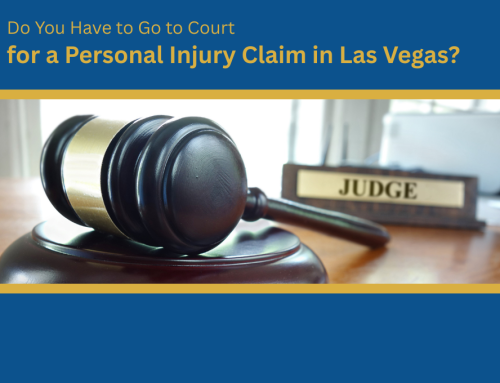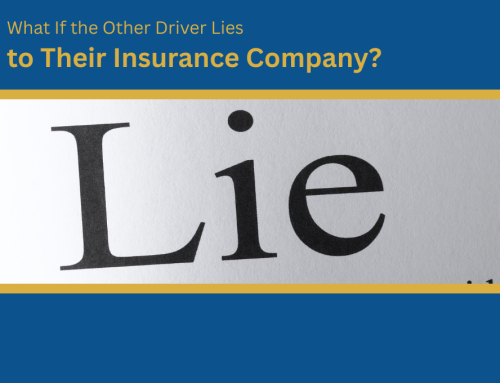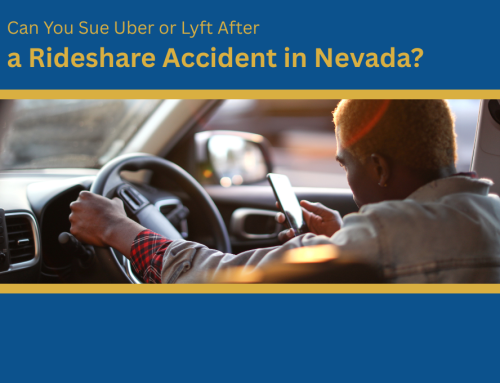
You may feel fine. You may even believe you are safe behind the wheel. But after a concussion, your brain does not function the way it used to. Every second counts on the road, and a delayed reaction could lead to a serious accident.
A concussion may seem like a minor injury, but it can slow your reflexes, blur your vision, and impair your ability to stay focused. These are not just symptoms. There are risks that can turn an ordinary drive into a dangerous one.
In this blog, we explore how concussions affect driving ability, what Nevada law says, and what to do if you or someone else causes a crash while recovering from a head injury.
Understanding What a Concussion Really Does to the Brain
A concussion is a mild traumatic brain injury. It usually happens when a sudden blow or jolt causes the brain to bounce or twist inside the skull. This movement can damage brain cells, cause chemical changes, and disrupt normal brain function.
Even if a person does not lose consciousness, they may still suffer from memory problems, confusion, dizziness, and slowed reaction times. These effects can last for days, weeks, or longer.
The brain needs rest to recover. Doctors often advise avoiding screen time, loud environments, and physical activity. Driving is one of the last activities a person should resume, as it requires full mental and physical alertness.
To learn more about how serious brain injuries impact daily life, visit our page on Las Vegas brain injury attorney.
Why Driving After a Concussion Is Dangerous
You might think you are ready to drive again after a head injury. However, concussion symptoms can return or worsen without warning. Driving during this time puts you and others in harm’s way.
Here are the key reasons why driving after a concussion is unsafe:
- Delayed reaction times: Your brain may take longer to process hazards, which increases the risk of a crash.
- Vision issues: Blurred or double vision can make it hard to judge distances and read road signs.
- Fatigue: Concussions often cause mental exhaustion, which can reduce your ability to concentrate.
- Memory loss: You may forget where you are going or miss traffic signals.
- Mood changes: Irritability or confusion may affect your decision-making on the road.
Any of these symptoms can affect your ability to drive safely. If you feel even slightly impaired, it is best to stay off the road until a medical professional says you are fit to drive.
Our Las Vegas vehicle accident attorney team has handled cases where a driver was not fully recovered and caused harm to others. These situations often lead to legal consequences.
Signs You Are Not Ready to Drive Yet
It is not always easy to know when your brain has healed. Some symptoms of a concussion can linger or reappear when you try to focus or engage in demanding tasks like driving.
Avoid driving if you experience any of the following:
- Headaches or migraines
- Nausea or dizziness
- Light or sound sensitivity
- Blurry or double vision
- Trouble concentrating
- Poor memory or confusion
- Difficulty staying awake or alert
These symptoms mean your brain is still healing. Driving during this period increases the chance of an accident.
If you have been involved in an incident where someone with these symptoms caused harm, speak with our legal team. We have extensive experience with Las Vegas wrongful death, workplace injuries, and other injury-related claims.
What Nevada Law Says About Driving with a Head Injury
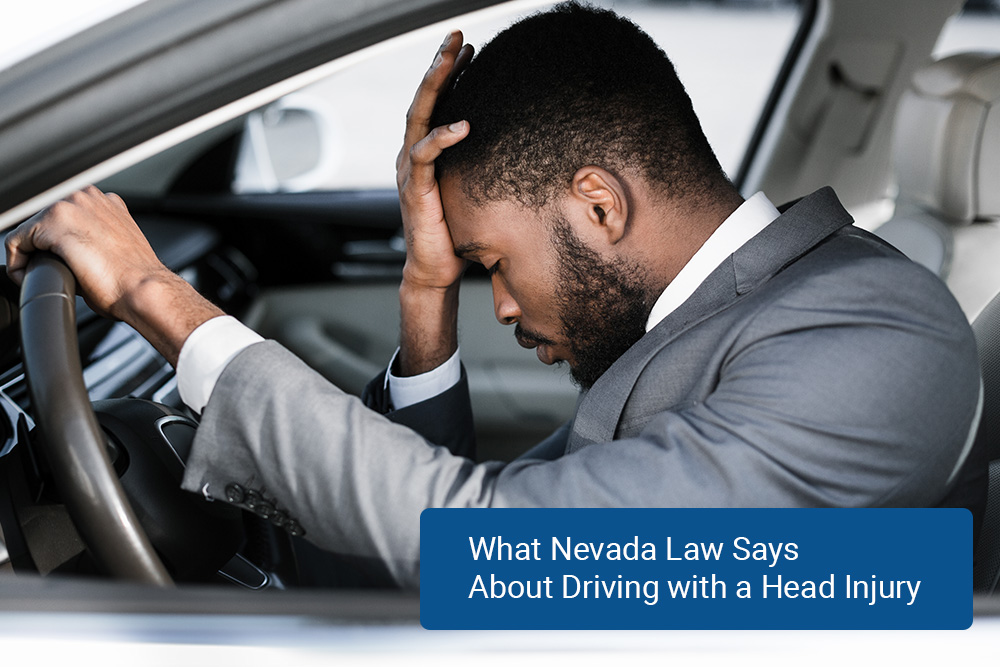
Nevada does not have a specific law about concussions and driving. However, every licensed driver in the state has a legal duty to operate a vehicle safely and responsibly.
Driving while mentally or physically impaired—regardless of the cause—can be considered negligent. If a driver knew they were not in full control of their faculties and still chose to drive, they may be held liable for any harm they cause.
This is especially important in civil injury claims. Victims can seek compensation for medical expenses, lost wages, and pain when another person acted recklessly or carelessly.
If you were hurt in such an accident, visit our practice areas to understand your legal options or explore our legal resources for more guidance.
What to Do If You Were Hit by a Driver with a Concussion
If you believe the person who caused your accident was still recovering from a head injury, there are steps you should take immediately.
- Call law enforcement: A police report provides official documentation of the event.
- Get medical care: Even if you feel fine, injuries can develop over time.
- Document the scene: Take photos of damage, injuries, and anything unusual about the other driver’s behavior.
- Collect witness information: Bystanders may have noticed signs of confusion or impairment.
- Speak with an attorney: A lawyer can help gather medical records, evaluate your case, and deal with insurers.
It may be difficult to prove that a concussion contributed to the crash. That is why you need a legal team that knows how to investigate and build a solid case.
To get started, reach out through our contact page for a free consultation.
Injured Because of a Head Injury Behind the Wheel?
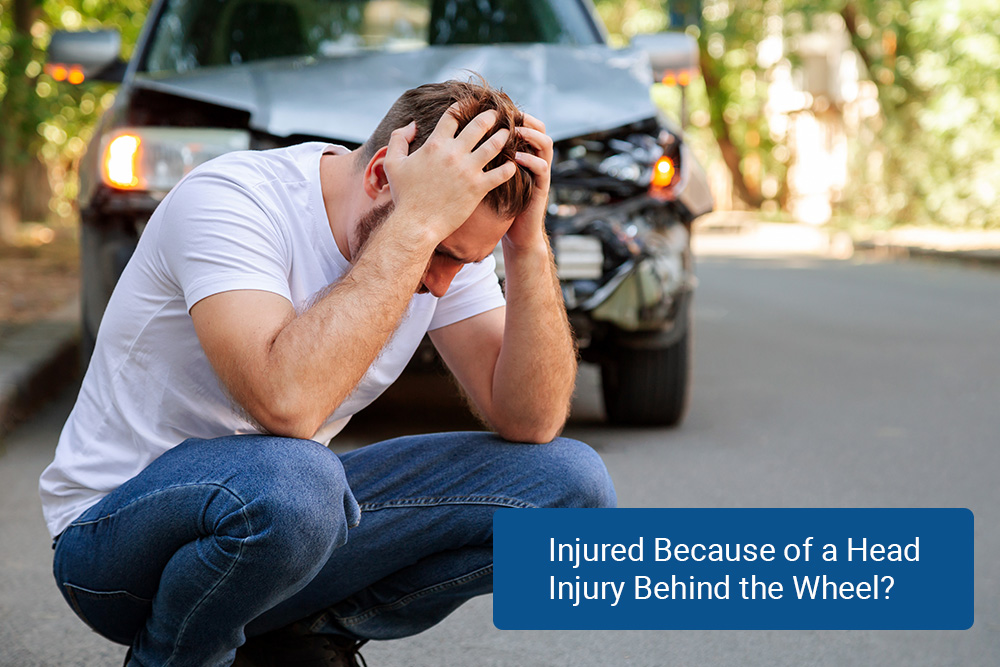
At Lach Injury Law, we believe no one should suffer because another person failed to act responsibly. Driving with a concussion is not just risky. It can be deadly. If you or someone you love was injured by a driver who may have been impaired due to a brain injury, we are ready to help.
Our team has deep experience with accident cases involving physical and cognitive impairment. We can guide you through every step of the legal process—from documenting evidence to negotiating a fair settlement.
You deserve answers. You deserve care. And above all, you deserve justice.
Visit lachinjurylaw.com to learn more about how we protect victims of head injury crashes, or review more insights on our blog. If you are ready to speak with a legal expert, contact us today. Your safety is our mission.

